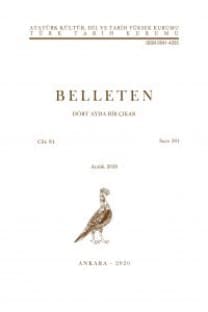XVIII. Yüzyıl Osmanlı Tarih Yazıcılarından Hazine-i Birûn Kâtibi Ahmed Bin Mahmud’un Hayatı
Berlin Staatsbibliothek Orientabteilung, Ms. or. quart. 1209 numarada kayıtlı hazine-i birûn kâtibi Ahmed bin Mahmud(1) tarafından tutulan, Osmanlı Devleti'nin XVIII. Yüzyıl siyasi, sosyal ve ekonomik hayatına ilişkin önemli kayıtlara sahip olan mecmûa ve yazarı, Osmanlı tarihi araştırıcıları tarafından oldukça az tanınmaktadır. Özellikle eserin sahibi hazine-i birûn kâtibi Ahmed Efendi'nin hayatına ilişkin başka kaynaklarda ayrıntılı bir bilgiye tesâdüf edemediğimiz gibi, bu hususta yazılmış eldeki mevcut verilerinde eksik ve kifayetsiz kaldığını, hatta yanlış yorumlandığını gördük. Bu noktadan hareketle Ahmed b. Mahmud'un hayatına ilişkin toplu bir yorum ve yeni bir bakış açısı getirmeden önce yazar hakkında çok az kaynakta rastlayabildiğimiz kısa ve sınırlı bilgileri burada kaydetmekte fayda görüyoruz.
The Life of Ahmed Bin Mahmud, Clerk of the Public Treasury and a Scribe of 18TH Century Ottoman History
There remain a very large number of hand-written Ottoman manuscripts outside of Turkey that are awaiting investigation. One of these is a single copy of a manuscript, today in the collection of the Berlin Staatsbibliolthek Orientabtilung (Ms.or.quart 1209), that was written by Ahmed Bin Mahmud, a clerk at the hazine-i birun (Public Treasury). Very little is known about either this manuscript or about its writer, Ahmed b. Mahmud, a researcher of Ottoman history. Actually, Ahmed b. Mahmud was, both a witness and a recorder of the political, social, and economic changes that were occurring in the Ottoman Empire of the 18th century. For this reason, this record represents a primary resource for those who are researching the history of the Ottoman State during this time period. The almost 150 page portion of the manuscript that is devoted to the events occurring within the state during the years spanning 1711-1759 represents a very significant chronicle. Because Ahmed b. Mahmud was not an official state historian he was able to impart his own ideas into the chronicle and in this respect this manuscript becomes quite different from other contemporary chronicles. In this work, for the first time Ahmed bin Mahmud ventures off part of an endeavor to bring a more general perspective to his life and his work.
Keywords:
18TH Century, Ottoman, Ahmed Bin Mahmud History,
___
- ISSN: 0041-4255
- Yayın Aralığı: Yılda 3 Sayı
- Başlangıç: 1937
- Yayıncı: Türk Tarih Kurumu
Sayıdaki Diğer Makaleler
İngiliz Konsolosu Longworth'a Göre Trabzon Vilayeti (1892-1898)
Memlûk-Moğol Mücadelesi ve Orta Doğu Tarihine Etkileri
Taylesanizâde Hâfız Abdullah Efendi Tarihi. Istanbul'un Uzun Dört Yılı (1785-1789)
Batı Anadolu Bölgesi Tarihöncesi Dönemlerine Yeni Katkılar
Ioannes Chrysostomus’un Düşüşü: Doğu Roma Başkentinde Din ve Politika
